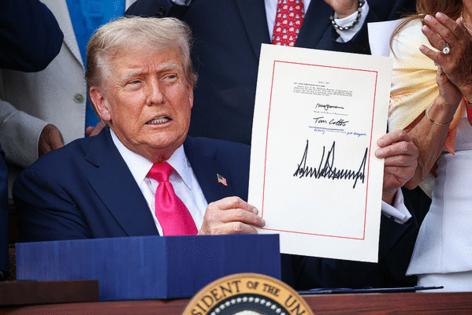DHS: 140,000 Minnesotans could lose health insurance under federal tax cut and spending package
Published in News & Features
Close to 140,000 Minnesotans are likely to lose health care coverage under Medicaid cuts that are expected to cost the state $1.4 billion in federal revenue over the next four years, according to a new analysis from state health officials.
The Minnesota Department of Human Services released updated projections Monday of the impact the federal tax and spending bill will have on the state. The legislation, which President Donald Trump signed earlier this month, makes cuts to Medicaid, cuts income taxes and is estimated to add $3.3 trillion to the national debt.
The legislation also imposes work requirements on adult Medicaid enrollees, caps provider taxes that help states pay for the program, increases costs on low-income enrollees and reduces compensation to states for providing care to immigrants with life-threatening emergencies.
Some 1.2 million Minnesotans depend on Medicaid, meaning more than 10% of them are now expected to lose their coverage.
Over the first four years, DHS expects the Medicaid changes to cost Minnesota and health care providers $1.4 billion in lost federal funding.
Costs to enrollees are expected to rise, said John Connolly, a deputy commissioner for DHS. He added that affected Minnesotans will likely forgo preventative care only to wind up in hospitals with emergencies.
“That’s bad for people seeking care, and also bad for health care providers, and it’s bad for the state budget,” Connolly said.
The bill Trump pushed through the GOP-controlled Congress will mean monumental changes to Medicaid, known in Minnesota as Medical Assistance.
The likely increase in the number of uninsured Minnesotans going to emergency rooms for treatment, Connolly said, will mean hospitals won’t be reimbursed for more of their services. That in turn will increase costs for individuals on private insurance as hospitals increase prices to cover their costs, he added.
“This is going to be hugely expensive to cover fewer people,” said state Sen. Erin Maye Quade, DFL-Apple Valley, “to have more people with no health care, with no health insurance coverage, to have fewer hospitals. ... I didn’t think it was possible to make a bill this bad, and yet here we are.”
Maye Quade, who sits on the Senate Human Services Committee, said she thought the Legislature would need to come back for a special session to address the fallout from the bill. However, Gov. Tim Walz told MinnPost last week he didn’t expect to call one.
State Rep. Jeff Backer, R-Browns Valley, said he welcomed the new oversight and work requirements. He thinks the state will find a path forward to deal with the federal cuts.
“I’m quite concerned right now that there’s a lot of doom and gloom before we have all the data and so forth,” said Backer, the Republican co-chair on the House Health Finance and Policy Committee. “Minnesotans love taking care of Minnesotans, so I’m just concerned that (DHS is) blowing a horn that should not be that loud.”
Maye Quade and state Rep. Robert Bierman, DFL-Apple Valley, said the state doesn’t have the resources to fill the holes left by the federal bill.
Bierman, the Democratic co-chair of the House committee, noted the huge increase to the national debt projected from the bill.
“What we’re achieving is simply taking health care away from the poorest of the poor in this state ... and giving it to some of the wealthiest people in the country, so it’s mind-boggling to me,” he said.
Sen. Melissa Wiklund, DFL-Bloomington, chair of Senate Health and Human Services Committee, said the bill would make it difficult for Minnesota to maintain its health care system.
“These changes will cut hundreds of millions of dollars in funding and add hundreds of millions in new costs to state and county budgets, all with the goal of removing health care access to Minnesotans currently relying on it,” she said.
Sen. Paul Utke, R-Park Rapids, called DHS’ figures “concerning,” but “manageable.” Utke is the ranking Republican on the Senate committee.
He said government creates issues for providers in the Medicaid program by not reimbursing them at high enough rates for their services.
“The reconciliation bill is not doing anything unreasonable,” Utke said. “There’s a whole lot of people running scared, but they need to look at what it is.”
The Department of Human Services is still assessing the impact to the state budget. With health spending already a growing part of Minnesota’s spending and contributing to a long-term imbalance, Connolly said the state may have to shore up its budget.
“It will exacerbate that challenge,” Connolly said.
_____
©2025 The Minnesota Star Tribune. Visit startribune.com. Distributed by Tribune Content Agency, LLC







Comments